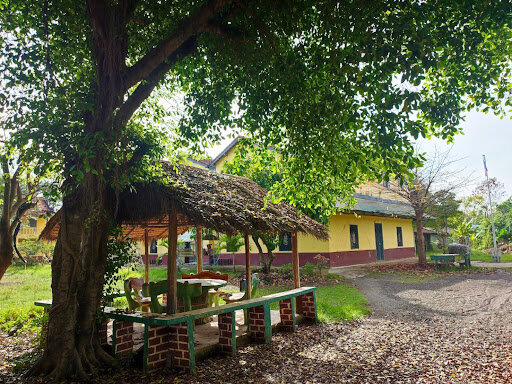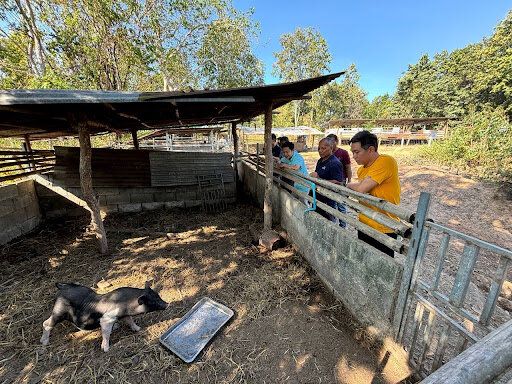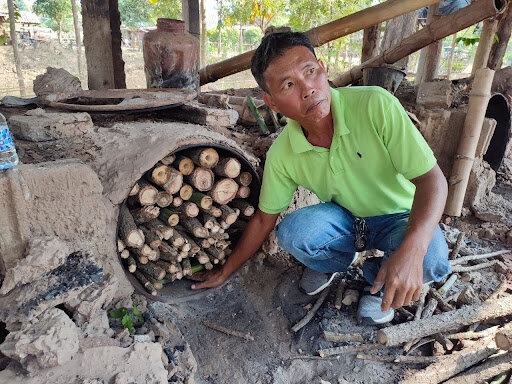By Ai Igarashi | Member of Advocacy Team
We’re so thankful for your support and interest in what we’re doing. In this report, we’re going to share the latest news about our work to set up the agricultural training center in Battambang City, Cambodia.
In 2025, we are actively engaged in the preparations to open an agricultural training center in Battambang City.
Up until now, we have been supporting vulnerable households, including landmine victims living in landmine-contaminated areas, mainly through the provision of agricultural tools and training to improve their livelihoods.
Through our work, we’ve learned that many vulnerable rural households engage in agriculture and can sustain their lives with appropriate techniques and knowledge.
On the other hand, as the number of households we assist continues to grow, the way our staff travel to remote villages to conduct training has become increasingly difficult tomanage.
Having reached over 250 households over the past several years through our livestock support program of lending livestock, we now face the challenge that our staff alone find it difficult to provide adequate and timely support when livestock get sick or are sold.
Therefore, in Samlot District, Battambang Province, as a JICA Grassroots Partnership Project since January 2023, we have been working to build a support system for vulnerable households by training young staff within existing agricultural cooperatives.
Furthermore, in Rokabus Village, Kamrieng District, where we have been providing support, we have also carried out training programs, mainly for university students who had been taking online classes in the village during the COVID-19 pandemic.
However, the limited capacity for training within each village, community, or agricultural cooperative presents a significant challenge. Furthermore, despite improvements in road conditions, the travel time required to reach target areas remains a major bottleneck.
The idea for the agricultural training center was originally sparked by a personal experience I had before the COVID-19 pandemic.
In Thailand, as in Cambodia, economic development has brought major changes to traditional rural life. Forests that were once abundant have been cleared, and large-scale cash crop farming has expanded as people seek ways to earn income.
Sugarcane for sugar production became widely cultivated in this region. However, there are serious doubts about whether this cultivation has actually improved the lives of farmers. Even when they were harvested, they were bought at unfairly low prices, and the use of pesticides and chemical fertilisers has led to land contamination and soil degradation. Because farmers only cultivate a single crop, they could no longer maintain their traditional way of life that utilised natural resources.
Driven by those concerns, local people decided to establish a center that focuses on training in sustainable, self-sufficient agriculture and life skills.
Trainees from rural areas in Thailand and Laos came to the center, learning various skills not only in theory but also through practical experience.
During my short stay, one of the teachers at the center taught me how to catch fish with a cast net. However, it was my first time, and I unfortunately was not able to catch a single fish that day. That meant there would be nothing for everyone to eat for dinner.
We still clearly remember the words the teacher told me:
"If you couldn't catch any fish, go to the chicken coop. There might be chickens laying eggs there, so you can cook with them. If there are no eggs, go to the vegetable garden. You will find all sorts of vegetables planted there, so if you harvest some, you'll have something to eat. But the one thing we don't want you to do is go to the market and buy something. Please don’t do that."
In this center, they actually achieve self-sufficiency in food and energy through rice cultivation, livestock farming, including pigs, chickens, ducks, goats, buffaloes, various vegetable cultivation, fish farming, bamboo cultivation, charcoal making, soap making, and organic fertiliser making. Since the forest still remains intact, mushrooms grow on their own during the rainy season. They do have access to electricity and running water, but even if those were to stop, they would still be able to live self-sufficiently. At the same time, they sell charcoal and compost, and the students manage their own money, which they distribute among themselves to fund their own homes when they complete the two-year program.
What surprised me was that even the daily curriculum was not entirely planned by the teachers - the students decided for themselves what to do each day and reported it to the teachers, making the program run in a very self-directed way.
From my own experiences at the Tabutawan Learning Center, we decided to open an agricultural training centre in Battambang, Cambodia, modelled on the Tabutawan Learning Center. Now, we are selecting trainees who learn at our center!
At this centre, we intend to train and empower local people to create more stable and resilient communities where villagers can live sustainably on land after it has been cleared of landmines.
Tai Ezumi, Head of Cambodia Office
Links:
Project reports on GlobalGiving are posted directly to globalgiving.org by Project Leaders as they are completed, generally every 3-4 months. To protect the integrity of these documents, GlobalGiving does not alter them; therefore you may find some language or formatting issues.
If you donate to this project or have donated to this project, you can receive an email when this project posts a report. You can also subscribe for reports without donating.
Support this important cause by creating a personalized fundraising page.
Start a Fundraiser

